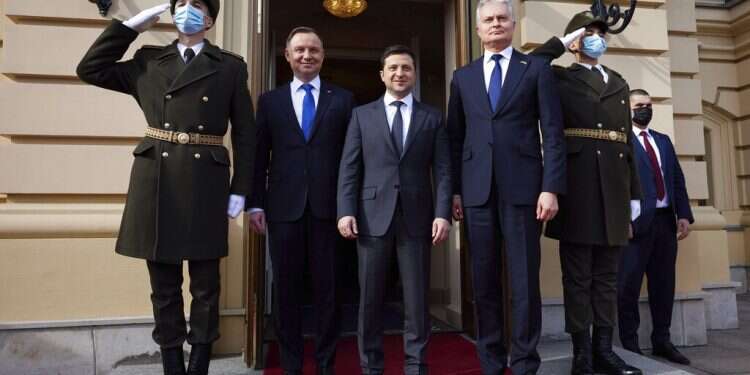In one fell swoop, Poland went from being a threat to the West's democratic-liberal political order to the tip of the spear in the fight to protect this order from what it suddenly sees as the preeminent threat: Russian President Vladimir Putin, and what the West perceives to be his "imperialistic" plan of expansion.
Follow Israel Hayom on Facebook, Twitter, and Instagram
Up until recently, US President Joe Biden refused to meet with his Polish counterpart, Andrzej Duda, due to what the Democratic administration believes to be the Polish government's conservative policies. The European Union, too, had mobilized to impose economic sanctions on Poland for "harming the values of the EU." Washington and Brussels now find themselves needing to recalculate their approach to Poland, because as a wise man once said: Everything is relative.
The efforts last summer to flood Poland, and through it Europe with "refugees" from the Middle East and Africa, via Belarus with Moscow's encouragement, were the promo for the real flood of refugees from Ukraine now seeking shelter in Poland. As long as Ukraine was there as a protective buffer on the EU and NATO's eastern flank, it was possible to patronize the Polish government and ignore its repeated warnings about the real threat facing Europe. Now, Poland is on the front lines. The British have already realized this and have deployed advanced defensive systems to Poland.
In the 1950s, the Polish capital lent its name to the military alliance the Soviet Union established with its satellite states in Eastern Europe at the time as a counterweight to the military alliance known as the North Atlantic Treaty Organization, or NATO. The "Warsaw Pact" fell apart with the collapse of the Soviet Union and the communist bloc in Europe in the early 1990s. Ever since, Poland has distanced itself as swiftly as possible from Russia, fearing that Moscow would not quickly lose its desire to regain its grip over Eastern Europe.
While Western European countries failed to take Poland's warnings very seriously, confident in their ability to undermine Russia's sphere of influence through support of democratic opposition elements and Western-leaning politicians, Poland pursued a practical and realistic approach and forged a new "Warsaw Pact," this time aimed at countering Russia. The increasing collaboration between Warsaw and former "Eastern Bloc" countries – those that have joined the EU and NATO and those that have not but also fear the Russian threat – has put Poland in a prominent position in Europe.
On Friday, the leaders of the nine countries that were once Soviet satellites will convene in Warsaw to form a united front against Moscow and force the West to take their concerns far more seriously. The main suspicion is that after attacking Ukraine, the Kremlin will try undermining stability in the Baltics, where significant Russian minorities reside. They also fear the creation of a heavily-armed Russian enclave, Kaliningrad, sandwiched between Poland and Lithuania along the Baltic coast.
The Russian attack in Ukraine is rightfully viewed as an attack on the "new world order" that was created in Europe and across the globe in the wake of the Cold War and the disintegration of the Soviet Union. Putin, in his perspective of the threats to Russia's security interests that stem from NATO's expansion into Moscow's traditional spheres of influence in Europe, is trying to draw a new European map. This puts Poland at the heart of the new East-West conflict. And this is a reality that Israel must also recognize.
Subscribe to Israel Hayom's daily newsletter and never miss our top stories!




